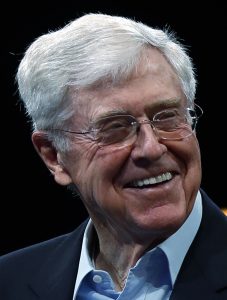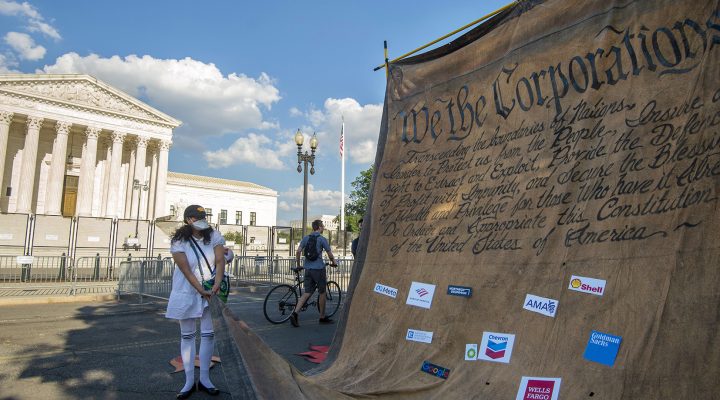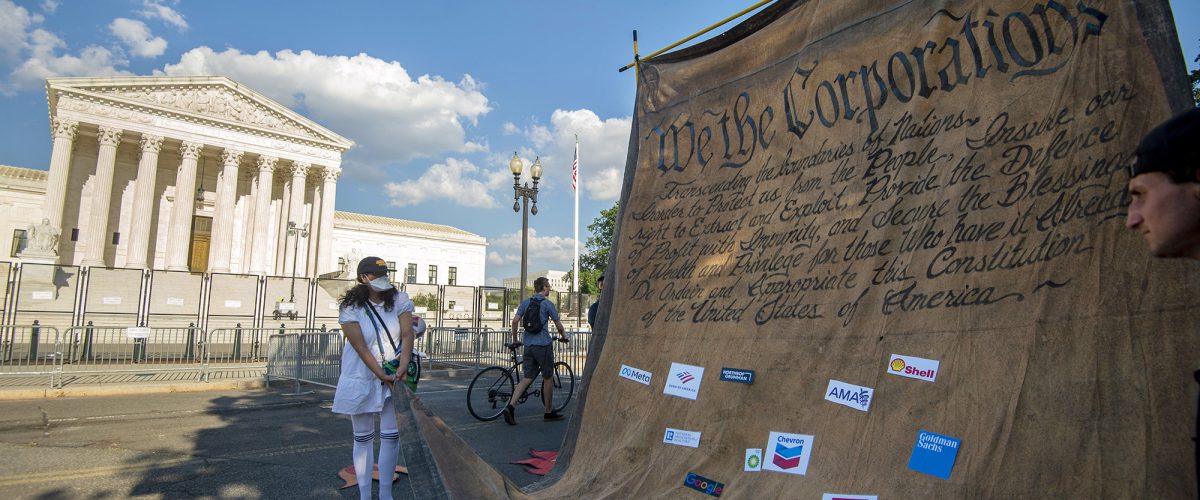On the surface, the case argued before the Supreme Court Jan. 17 is about two Atlantic fisheries upset about the federal regulations that restrict them. But dive a little deeper and you’ll see the bigger issue: Decades-old battles over how much power federal agencies should have.
A law passed in 1976 requires commercial herring fishermen to host federal regulators on their boats so they can collect data used to prevent overfishing. Most people agree the law saved the industry from self-destruction, but fisheries in New Jersey and Maine claim government fees unjustly harmed their businesses.

Charles Koch, (AP Photo/David Zalubowski,)
Their case is being handled by lawyers paid by petrochemical billionaire Charles Koch, who seems to think now’s the best time to ask the court to fulfill conservatives’ decades-long desire to throttle the “administrative state” and make it harder for all federal agencies to do their work, reported The New York Times.
If Koch’s lawyers succeed, the EPA would find it more difficult to enforce laws against polluters like Koch Industries, which paid hundreds of millions of dollars in fines, penalties and judgments for 150 environmental violations in 20 states over the past 20 years, according to one progressive group.
But the consequences of such a ruling would go far beyond herring and the EPA, limiting the authority of all federal agencies that regulate Americans’ food, drugs and safety.
Koch Industries is a $125 billion family owned global conglomerate that produces oil, natural gas, chemicals, minerals, plastics and more. Its profits have funded influential conservative political groups including Americans for Prosperity. It also has supported Focus on the Family and its allied organizations.
The fisheries regulation case isn’t as well-known as recent Supreme Court cases on abortion and gay weddings, but its consequences could be more widespread.
“The U.S. Supreme Court’s biggest opportunity yet in its drive to curb federal regulators comes as the justices weigh a major legal shift that would crimp agency power over workplace conditions, drug safety and emerging issues such as climate change and cryptocurrency,” said Bloomberg Law.
Koch’s lawyers say these agencies often overstep their bounds, layering on new rules and fees Congress never legislated or intended.
The Biden administration is defending the agencies’ authority. Supreme Court precedents — including the 1984 Chevron decision — have established the authority of federal agencies to interpret ambiguities in the laws.
But Koch’s lawyers say Congress should settle arguments about how to interpret regulations, not the agencies.
The current Supreme Court, which has six conservative justices alongside three liberals, already has limited the EPA’s authority in a 2022 ruling. Liberal Justice Ketanji Brown Jackson has recused herself from the current case, leaving a 6-2 conservative majority.
Fox News reported: “A majority of conservative Supreme Court justices appear ready to put limitations” on agencies’ authority.
The case also has a fascinating personal back story. Supreme Court Justice Neil Gorsuch’s mother, Anne Gorsuch, served as an anti-regulatory head of the EPA during the Reagan administration.
A number of Christian legal groups are lining up in support of the fishermen and against the agencies.
A number of Christian legal groups are lining up in support of the fishermen and against the agencies.
The Focus-aligned legal group Alliance Defending Freedom is filing an amicus brief in support for the Christian Employers Alliance. CEA is an alliance of Christian-owned for-profit and nonprofit businesses in the United States.
CEA’s president, Shannon O. Royce, previously led the D.C. office of Southern Baptist Ethics and Religious Liberty Commission and served as COO of the Focus-aligned Family Research Council.
CEA’s director, Catherine O. Snow, previously served as the marketing and project manager for Focus on the Family’s Government and Public Policy division.
The American Center for Law and Justice, another Christian legal group, has filed an amicus brief. ACLJ is led by attorney Jay Sekulow, who also has represented Donald Trump.
The Becket Fund For Religious Liberty submitted an amicus brief on behalf of Little Sisters of the Poor Saints Peter and Paul Home in Pennsylvania.
Another legal group has submitted an amicus brief on behalf of 11 conservative and Christian groups: Advancing American Freedom; Center for Political Renewal; Christians Engaged; Eagle Forum; Frontline Policy Council; International Conference of Evangelical Chaplain Endorsers; Missouri Center-Right Coalition; National Center for Public Policy Research; Project 21 Black Leadership Network; Students For Life Of America; and Young America’s Foundation.


